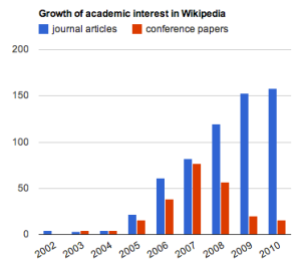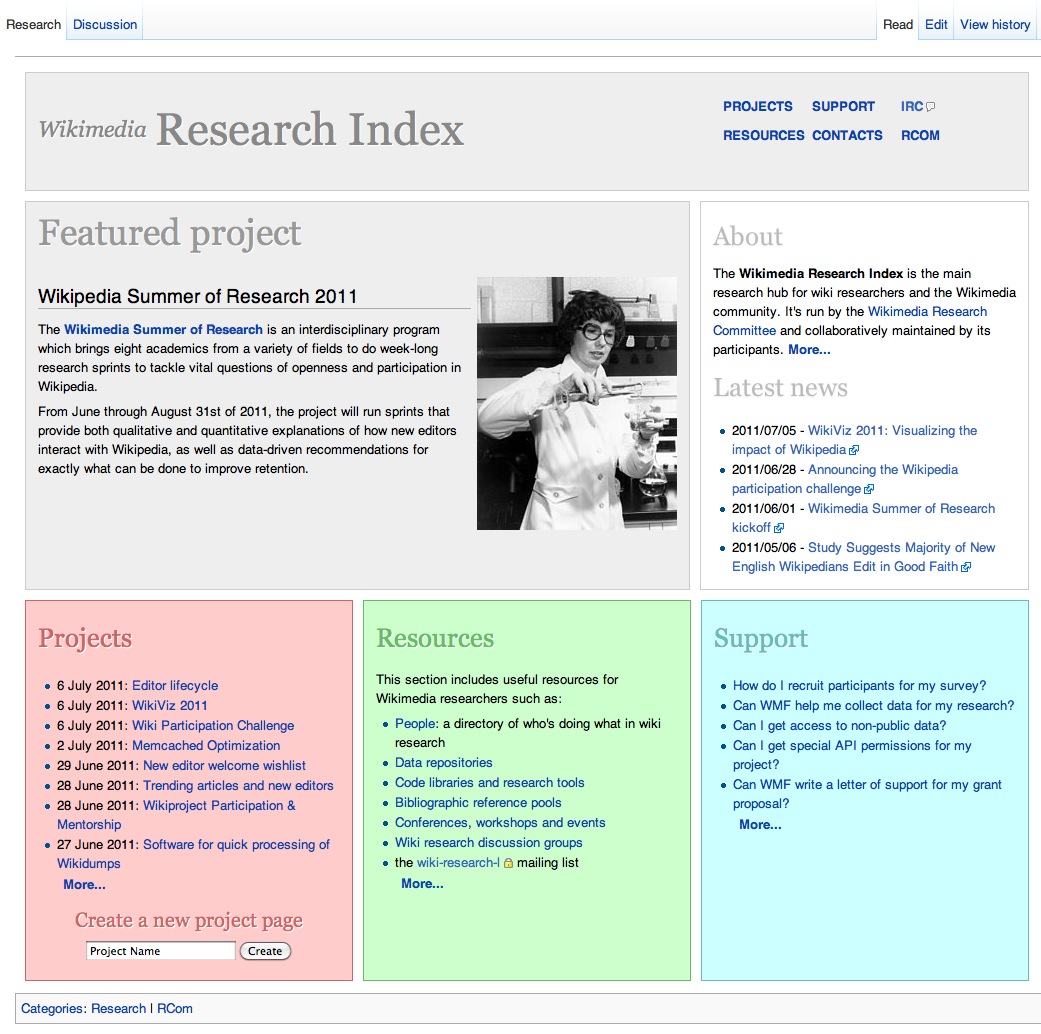 Wikimedia is in the exceptional position of having a thriving community of researchers who have been studying every single possible aspect of its projects for nearly a decade. Wikipedia as a topic for scholarly research, in particular, has seen a dramatic growth over the last few years, partly thanks to the effort of venues and communities such as WikiSym. Manually curated lists of scholarly studies on Wikipedia show a steady growth in attention in the academic community but probably underestimate the actual volume of scholarly publications on Wikipedia that get published every year (a search of the ACM digital library indicates that 82 papers were published in conference proceedings in 2010 with Wikipedia as a keyword in the title)
Wikimedia is in the exceptional position of having a thriving community of researchers who have been studying every single possible aspect of its projects for nearly a decade. Wikipedia as a topic for scholarly research, in particular, has seen a dramatic growth over the last few years, partly thanks to the effort of venues and communities such as WikiSym. Manually curated lists of scholarly studies on Wikipedia show a steady growth in attention in the academic community but probably underestimate the actual volume of scholarly publications on Wikipedia that get published every year (a search of the ACM digital library indicates that 82 papers were published in conference proceedings in 2010 with Wikipedia as a keyword in the title)
Despite this growth, resources for researchers and information about research of Wikimedia projects have been incomplete, unmaintained and scattered. Support for researchers from the Foundation has been ad-hoc and for a long time there hasn’t been a team in charge of reviewing external support requests or to facilitate collaboration with external researchers.
To answer to these problems the Research Committee recently started to rebuild the research documentation available on Meta. Today we are proud to announce the first version of the Wikimedia Research Index, the single go-to point for all research-related needs at Wikimedia.

The main purpose of a research index is to centralize documentation on research of Wikimedia projects, but also to create a place for the community to discuss and learn about this research. The Wikimedia Research Index will:
- provide documentation on resources for Wikimedia researchers, including datasets, tools and code libraries, conferences and events
- act as a point of contact for researchers with each other and the Foundation (by complementing wiki-research-l)
- formalize support for research projects and specify what the Foundation expects from the projects it supports
- host research policies and guidelines
- track research projects (both initiated by the Foundation and by the research community) that study Wikimedia contents and communities or that build innovative results and applications on top of Wikimedia data
These are some highlights from the Research Index:
- we have been working on a set of policies to ensure that research supported in different forms by the Foundation is released in the open (with respect not only to its output, but also to code and data). The new open access/open data policy of the Foundation will be announced in a separate post.
- as part of this work, we will be announcing soon the first in a series of monthly research newsletters covering the most recent updates in Wikimedia research, modeled around the Signpost
- we will be highlighting via the Research Index, the Foundation’s blog and the research newsletter a series of featured projects that touch on issues of particular strategic importance. The first featured project is the Wikimedia Summer of Research, hosted by WMF Community department
- we created a dedicated IRC channel on Freenode as a friendly place to discuss in real time issues of relevance to Wikimedia research
The Research Index is, by definition, a constant work in progress and there are several ways in which you can help us improve it: as a researcher, by making sure that your past and current projects are documented in the research project directory and by bringing to our attention to any results, calls for papers and research-related initiatives we should be aware of (particularly if you wish to have them included in the research newsletter); as a community member by participating in project-specific discussions, by highlighting issues that are particularly sensitive from a community perspective and by suggesting topics and issues in search of an answer from the research community.
We hope with this initiative to increase the volume, speed, impact and potential audience of research that helps improve our understanding of Wikimedia projects and communities.
Dario Taraborelli, Senior Research Analyst, Strategy

Can you help us translate this article?
In order for this article to reach as many people as possible we would like your help. Can you translate this article to get the message out?
Start translation